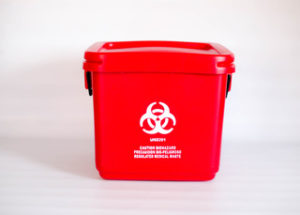Professional Solutions for Health And Wellness: Introducing the Medical Waste Removal Service Benefit
The Value of Appropriate Waste Disposal Practices
From the effects of inappropriate waste disposal on our environment to the long-lasting effects for future generations, the importance of taking on sustainable waste administration methods can not be overstated. By exploring the ecological influence of careless waste disposal, the benefits of reusing efforts, and the importance of area involvement in waste reduction efforts, a much deeper understanding of why correct waste disposal practices are crucial emerges.
Environmental Effect of Improper Disposal
Inappropriate disposal of waste poses a significant threat to the atmosphere as a result of its detrimental effects on environments and human wellness. When waste is not properly managed, it can result in contamination of the air, water, and dirt, triggering damage to different plant and pet types. click here. Chemicals and toxic substances from improperly disposed waste can permeate right into the ground, infecting groundwater resources and affecting the health of both wildlife and people
Furthermore, the buildup of waste in garbage dumps creates greenhouse gases like methane, adding to climate modification and worldwide warming. Incorrect disposal practices likewise lead to littering, which not only deteriorates the aesthetic value of the environment yet can also harm wild animals via intake or complexity.
To alleviate these ecological impacts, it is important for neighborhoods and individuals to adopt correct garbage disposal methods such as recycling, composting, and responsible dangerous waste disposal. By taking these steps, we can aid shield ecosystems, maintain all-natural sources, and secure human health and wellness for present and future generations.
Benefits of Recycling Programs
Routinely participating in recycling programs supplies countless benefits for both the atmosphere and society overall. One of the crucial advantages of recycling is the preservation of natural deposits. By recycling products such as paper, plastic, glass, and steel, much less resources need to be extracted from the earth, resulting in decreased deforestation, mining, and exploration tasks. This preservation of resources not only helps in keeping ecological equilibrium but additionally contributes to lasting development.
Additionally, reusing plays a crucial duty in minimizing energy intake and greenhouse gas emissions. The manufacturing of items from recycled materials normally calls for less energy contrasted to producing from virgin sources - medical waste removal. As a result, the carbon impact connected with the production procedure is considerably reduced, assisting in the battle against environment change
Additionally, recycling programs develop work opportunities in the recycling market, promoting financial growth and social welfare. By motivating the recycling and reuse of products, these programs sustain a round economy that reduces waste generation and takes full advantage of source performance, ultimately resulting in a cleaner, greener future for generations to find.
Contaminated Materials Administration Standards
Implementing effective dangerous waste administration standards is critical for minimizing environmental and health and wellness threats linked with the inappropriate disposal of unsafe products - click here. Correct handling, therapy, and disposal of contaminated materials are important to avoid contamination of soil, water sources, and air
One key guideline appertains labeling of contaminated materials containers to make certain safe handling and transportation. Additionally, facilities must stick to strict storage space requirements to stop leaks, spills, or accidents that can jeopardize human health and wellness and the atmosphere. Regular training programs for workers on harmful waste administration methods are also vital to ensure conformity with laws and promote a culture of safety and security.
Moreover, contaminated materials should be segregated based upon its homes to stop chain reactions that could result in harmful situations. Carrying out a detailed waste monitoring system can help keep track of the movement of harmful materials from generation to disposal, making certain openness and accountability. By adhering to these standards vigilantly, sectors and businesses can add to a much safer and cleaner setting for future and existing generations.
Community Participation in Waste Decrease
To successfully resolve the environmental and wellness threats related to contaminated materials administration, engaging the neighborhood in waste reduction campaigns is critical. Area involvement plays a vital role in advertising lasting waste management practices and promoting a culture of ecological duty. By educating homeowners regarding proper waste segregation, recycling, and composting techniques, neighborhoods can substantially decrease the quantity of waste sent to land fills, therefore reducing environmental pollution and preserving natural sources.
Area engagement in waste decrease programs additionally aids in elevating understanding regarding the significance of waste reduction and urges people to take on environmentally friendly habits in their lives - medical waste removal service. Collaborative initiatives in between regional authorities, waste monitoring companies, and neighborhood participants can bring about the implementation of reliable waste decrease methods tailored to the particular demands of each community or community
Additionally, area engagement fosters a feeling of possession and accountability among residents, empowering them to take aggressive actions in the direction of reducing waste generation and advertising a cleaner, healthier environment for current and future generations. By collaborating in the direction of usual waste decrease goals, neighborhoods can make a considerable effect on mitigating the negative results of inappropriate waste disposal practices.

Future of Sustainable Waste Practices
Standard waste disposal techniques, such as landfilling and incineration, are no much longer lasting in the lengthy term due to their considerable ecological influences. Moving ahead, the future of lasting waste techniques lies in embracing a circular economic climate method, where sources are reused, recycled, or repurposed to reduce waste generation.
Technical technologies play a key duty fit the future of lasting waste practices. Advanced waste sorting and reusing innovations can aid boost the effectiveness of waste monitoring procedures, permitting the healing of beneficial sources from waste streams. In addition, the fostering of naturally degradable materials and composting approaches can help in reducing the amount of natural waste winding up in garbage dumps, thereby reducing greenhouse gas emissions.
In addition, advertising customer recognition and education on appropriate waste partition and disposal methods is vital for driving behavioral adjustment towards sustainability. By cultivating a society of waste reuse, recycling, and decrease, neighborhoods can collectively contribute to a cleaner and much healthier setting for future generations.

Final Thought
Finally, proper waste disposal methods are critical for reducing environmental impact their website and advertising sustainability. By applying recycling programs, taking care of contaminated materials properly, and encouraging community participation in waste decrease initiatives, we can function in the direction of a cleaner and much healthier environment. It is essential for governments, individuals, and companies to prioritize sustainable waste methods for the future health of our planet.

From the effects of inappropriate waste disposal on our atmosphere to the lasting effects for future generations, the relevance of taking on sustainable waste administration methods can not be overemphasized. By checking out the ecological impact of irresponsible waste disposal, the benefits of reusing campaigns, and the relevance of neighborhood engagement in waste reduction initiatives, a deeper understanding of why correct waste disposal techniques are essential emerges.
By educating residents regarding proper waste partition, recycling, and composting strategies, areas can significantly reduce the amount of waste sent to garbage dumps, thus lessening ecological air pollution and conserving natural sources. (click here)
Moving onward, the future of lasting waste techniques exists in accepting a circular economic situation strategy, where resources are reused, recycled, or repurposed to decrease waste generation.
Advanced waste sorting and recycling technologies can help improve the efficiency of waste monitoring processes, allowing for the healing of useful sources from waste streams.